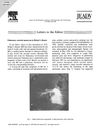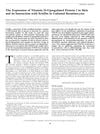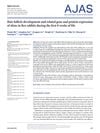 3 citations,
September 1999 in “Journal of the European Academy of Dermatology and Venereology”
3 citations,
September 1999 in “Journal of the European Academy of Dermatology and Venereology” People with Behçet's disease can develop life-threatening lung artery aneurysms that may require surgery.
 25 citations,
March 2017 in “Archives of Dermatological Research”
25 citations,
March 2017 in “Archives of Dermatological Research” Sinapic acid may help hair growth by activating a specific cell pathway.
5 citations,
February 2022 in “Molecular genetics & genomic medicine” New gene variants linked to a rare inherited hair loss disorder were found in three Chinese families.
11 citations,
April 2012 in “Journal of Investigative Dermatology” A specific mutation in PA-PLA1α causes abnormal hair growth.
 3 citations,
February 2022 in “Frontiers in cell and developmental biology”
3 citations,
February 2022 in “Frontiers in cell and developmental biology” A specific RNA molecule, circCOL1A1, affects the growth and quality of goat hair by interacting with miR-149-5p and influencing cell growth pathways.
 11 citations,
January 2015 in “Dermatology”
11 citations,
January 2015 in “Dermatology” The conclusion suggests a new way to classify bradykinin-mediated angio-oedema based on different causes and its possible link with urticaria, which could improve diagnosis and treatment.
 18 citations,
March 2015 in “Journal of Endocrinological Investigation”
18 citations,
March 2015 in “Journal of Endocrinological Investigation” The research suggests that the ZP4 gene is linked to egg development in women with PCOS but requires more study to understand its role in infertility.
 7 citations,
January 2022 in “Plants”
7 citations,
January 2022 in “Plants” Rice husk and bran extracts from the Bue Bang 3 CMU variety can potentially treat hair loss due to their antioxidant, anti-inflammatory, and anti-androgenic properties.
7 citations,
October 2011 in “BMC Cancer” Overexpression of HDGF in melanocytes does not cause cancer.
 18 citations,
September 2003 in “The journal of investigative dermatology/Journal of investigative dermatology”
18 citations,
September 2003 in “The journal of investigative dermatology/Journal of investigative dermatology” VDUP1 is found in skin and hair follicles, interacts with sciellin, and may help regulate skin cell differentiation.
3 citations,
November 2021 in “Journal of Clinical Laboratory Analysis” hsa_circ_0001079 may help diagnose and treat hair loss.
 February 2024 in “New phytologist”
February 2024 in “New phytologist” DNA changes in tetraploid wheat improve root growth and nitrogen use.
 11 citations,
July 2014 in “Gene”
11 citations,
July 2014 in “Gene” The S250C variant in a gene may cause autoimmunity and immunodeficiency by impairing protein function.
11 citations,
September 2021 in “American Journal of Medical Genetics Part A” Four new cases of Bachmann-Bupp syndrome suggest potential for targeted treatment.
 14 citations,
September 2018 in “Asian-Australasian Journal of Animal Sciences”
14 citations,
September 2018 in “Asian-Australasian Journal of Animal Sciences” Rex rabbits' hair follicles develop dynamically in the first 8 weeks, with key genes and proteins changing over time.
 116 citations,
August 2010 in “Nature”
116 citations,
August 2010 in “Nature” Scientists turned rat thymus cells into stem cells that can help repair skin and hair.
32 citations,
September 2013 in “Breast cancer research” A specific gene variant is linked to a higher risk of hair loss from chemotherapy in breast cancer patients.
 11 citations,
August 2019 in “The Journal of Sexual Medicine”
11 citations,
August 2019 in “The Journal of Sexual Medicine” Women with nonclassic congenital adrenal hyperplasia experience more sexual dysfunction and distress.
11 citations,
May 2012 in “Genesis” Bmpr2 and Acvr2a receptors are crucial for hair retention and color.
8 citations,
December 2019 in “Molecular genetics and metabolism reports” Some children in Malaysia with symptoms have either profound or partial biotinidase deficiency, and early testing and treatment are important.
 43 citations,
February 2013 in “Developmental dynamics”
43 citations,
February 2013 in “Developmental dynamics” Foxi3 expression in developing teeth and hair is controlled by the ectodysplasin pathway.
 6 citations,
May 2021 in “Clinical Chemistry and Laboratory Medicine”
6 citations,
May 2021 in “Clinical Chemistry and Laboratory Medicine” Different ACE2 gene versions may affect COVID-19 impact based on age and suggest some hair loss drugs could be potential treatments.
 24 citations,
July 1994 in “Molecular Endocrinology”
24 citations,
July 1994 in “Molecular Endocrinology” Researchers found an RNA transcript that might help control a growth factor linked to tumor development.
 199 citations,
April 2010 in “Nature”
199 citations,
April 2010 in “Nature” A gene called APCDD1, which controls hair growth, is found to be faulty in a type of hair loss called hereditary hypotrichosis simplex.
 77 citations,
April 2004 in “Gene expression patterns”
77 citations,
April 2004 in “Gene expression patterns” The three estrogen receptor genes are highly expressed in zebrafish neuromasts during development.
 65 citations,
June 2003 in “EMBO journal”
65 citations,
June 2003 in “EMBO journal” Noggin overexpression delays eyelid opening by affecting cell death and skin cell development.
 2 citations,
September 2018 in “Tissue Engineering Part A”
2 citations,
September 2018 in “Tissue Engineering Part A” Xeno-free three-dimensional stem cell masses are safe and effective for improving blood flow and tissue repair in limb ischemia.
 6 citations,
July 2023 in “Nature cell biology”
6 citations,
July 2023 in “Nature cell biology” SOX9 helps determine stem cell roles by interacting with DNA and proteins that control gene activity.
 1 citations,
July 2023 in “Nature communications”
1 citations,
July 2023 in “Nature communications” MOF controls key genes for skin development by regulating mitochondrial and ciliary functions.
47 citations,
June 2017 in “The FEBS journal” Disabling the FGF5 gene in sheep leads to longer wool.





















